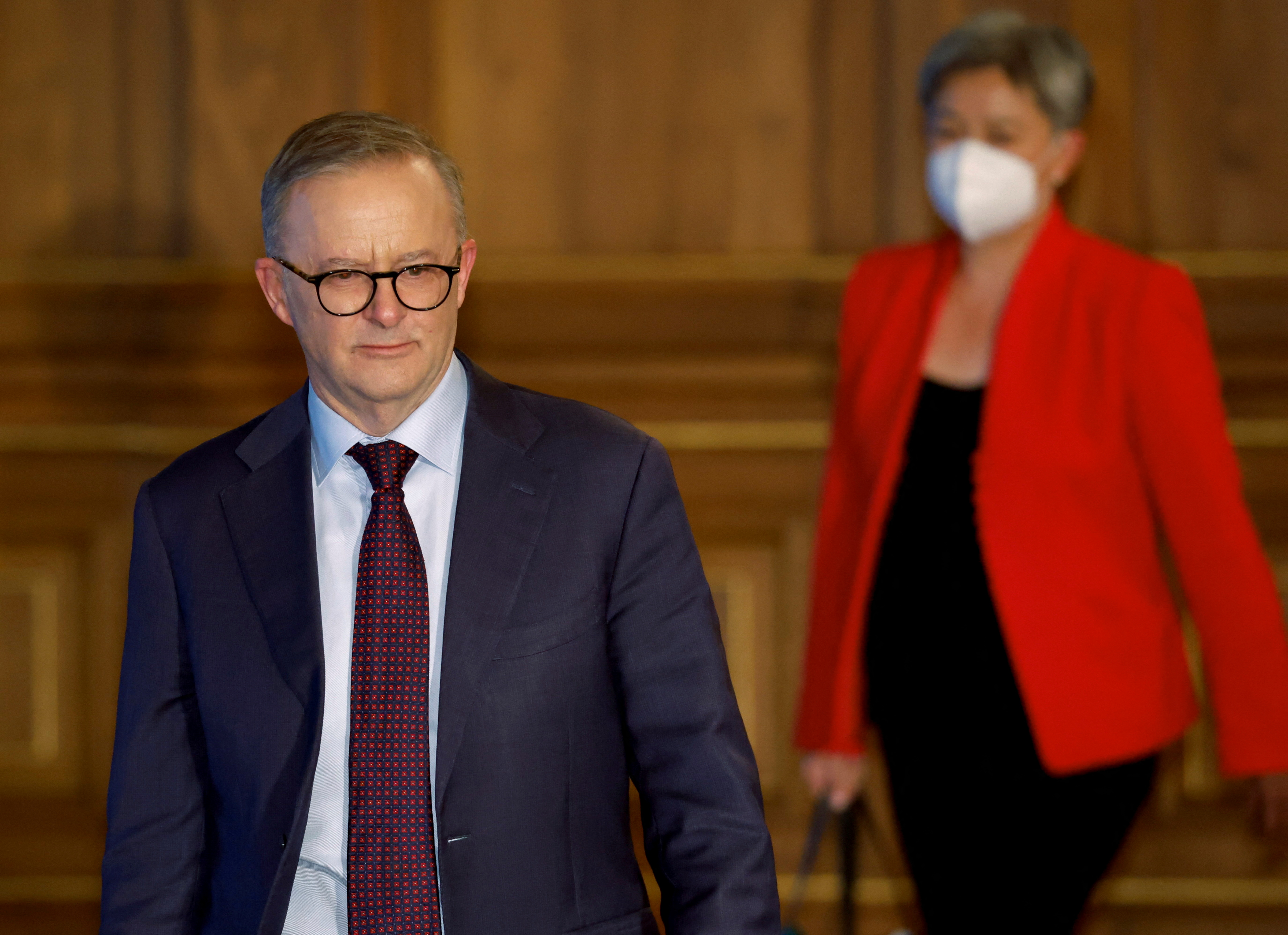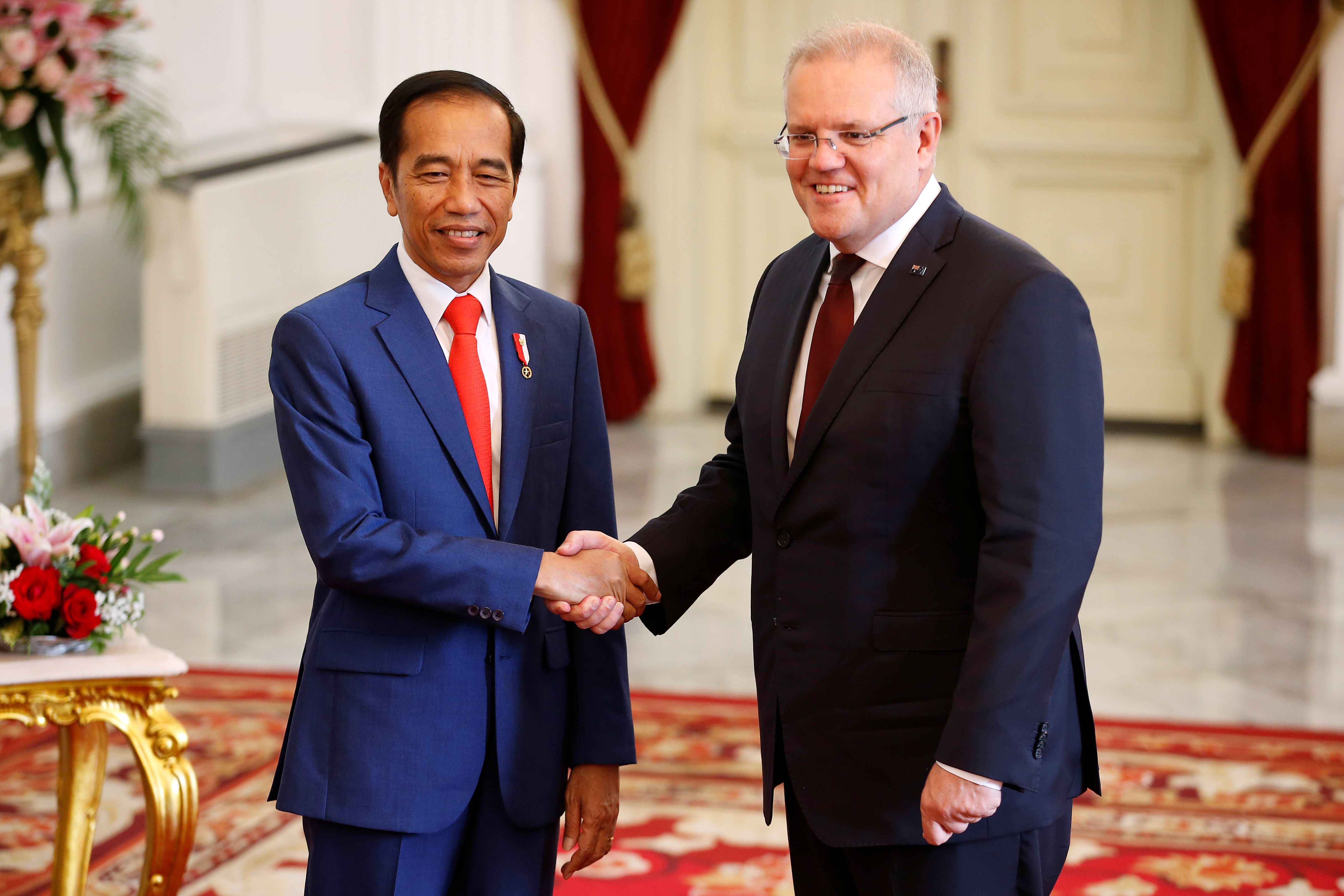
Medan, Indonesia – Australia’s Prime Minister Anthony Albanese and Minister for Foreign Affairs Penny Wong are due to arrive in Jakarta on Sunday in a sign that the country’s newly-elected Labor administration wants to breathe new life into Australia’s relationship with its closest neighbour.
There is hope that Wong in particular, who was born in Malaysia, will be instrumental in ushering in a new era of Indonesia – Australia ties.
“So far the signals appear to be positive, and Penny Wong will take the region seriously,” Ian Wilson, a lecturer in politics and security studies at Murdoch University in Perth, told Al Jazeera. “There seems to be real interest in reviving the relationship strategically.”
Historically, relations between Indonesia and Australia have been mixed, with analysts telling Al Jazeera that Labor governments, such as those led by Prime Minister Paul Keating in the early 1990s, have usually pursued deeper ties with the region than administrations from the Liberal National coalition under prime ministers such as Scott Morrison and Tony Abbott.
“The Indonesia and Australia relationship has blown hot and cold over the years,” Athiqah Nur Alami, the head of the Political Research Center at the Indonesian National Research and Innovation Agency (BRIN) told Al Jazeera.
“It has been like a rollercoaster, sometimes you scream and sometimes you laugh.”
What is planned in Indonesia?
Australia’s 31st prime minister will visit Indonesia June 5-7 and is scheduled to meet Indonesian president Joko Widodo, popularly known as Jokowi, on June 6.
In a tweet ahead of the visit, Albanese said he had spoken to Jokowi on the phone and was “looking forward to continuing our discussions about the ongoing partnership between our nations, including revitalising our trade relationship”.
The pair are expected to discuss the Indonesia-Australia Comprehensive Economic Partnership Agreement (IA-CEPA), which was signed in 2020.
Alami says the two countries are “neighbours that have to work together”, and told Al Jazeera that, while IA-CEPA is a comprehensive agreement based on four pillars of interest including economics, people, security and maritime cooperation, “there is still room for improvement”, particularly with regards to trade.
Albanese is expected to bring some of his new ministers with him on the trip, and Wong will meet her Indonesian counterpart Retno Marsudi on Sunday.
At a media briefing in Jakarta on Thursday, the director of East Asia and the Pacific at the Indonesian Ministry of Foreign Affairs, Santo Darmosumarto, said that it had been a tradition for newly-installed Australian prime ministers to make Indonesia one of their first overseas visits.
“It seems that Prime Minister Albanese will continue the tradition,” he said.
What is the current state of relations?
Indonesia is Australia’s largest neighbour, and while Jakarta lies more than 5,000 kilometres (310 miles) west of Canberra, the closest part of the archipelago is only a few hundred kilometres off the tip of Western Australia.
The country represents “one of Australia’s most important bilateral relationships”, according to the Australian Government Department of Foreign Affairs and Trade (DFAT), which adds that the two countries “enjoy extensive cooperation including on strategic, economic, security, development and education issues”.
According to Alami, Albanese’s trip can be seen as a signal that he intends to take the relationship seriously. Jokowi himself appears to be committed to strong ties with Canberra, visiting Australia four times since 2014, according to DFAT.

Alami says the two countries have worked well together in areas including maritime security, military training, and education, but notes that Indonesia trades less with Australia than its southeast Asian neighbours: Vietnam, Thailand and Malaysia.
“We have to show that we are serious about entering the market,” she said.
Indonesia is also the chair of the G20 summit this year, which will be held in Bali in November. Australia will be among the Asia Pacific countries attending in a year when there has been disagreement over Russia’s involvement as a result of its invasion of Ukraine.
“This is another important layer of their relationship,” Alami added.
Why have relations been difficult in the past?
While the two countries share trade and security interests, the relationship has sometimes been fraught.
“Under the Liberal National government, we saw diplomatic gaffes and generalised negligence, and a self-serving and clumsy relationship,” Murdoch University’s Wilson said. “Under Labor, hopefully we will see a big reset where we will prioritise the relationship.”
In 2013, relations soured when a number of media organisations published allegations that the Australian Signals Directorate had tried to monitor the private phone calls of the Indonesian President Susilo Bambang Yudhoyono, his wife Kristiani Herwati, and other senior Indonesian officials.
A diplomatic rift between the two countries emerged again in 2015 as Indonesia prepared to execute Australian nationals Myuran Sukumaran and Andrew Chan after they were found guilty of masterminding a nine-person drug smuggling ring trying to carry 8.3 kilograms of heroin from the Indonesian island of Bali to Australia in 2005.
The Australian government lobbied for the men’s lives to be spared, with then Prime Minister Tony Abbott referring to the aid Australia sent to Indonesia following the devastating 2004 tsunami – estimated at 1 billion Australian dollars ($780m) – and implying that the country owed Australia for the financial support.
Then in January 2021, Australia was upset after Indonesia announced it would free Islamist preacher Abu Bakar Bashir from prison because he had completed his jail term.
Morrison, who was then prime minister, called the release “distressing” for the families of those who had died in the Bali Bombings.
“It’s sometimes not a fair world,” he said.
Bashir was spiritual leader of Jemaah Islamiyah, the hardline group behind the 2002 bombings, which killed more than 200 people, including 88 Australians.
Could security concerns bring the two countries closer?
In recent years, China has become increasingly assertive in the disputed South China Sea, which it claims almost in its entirety.
It has also been reaching out to Australia’s traditional allies in the Pacific, creating alarm in Canberra, whose ties with Beijing have deteriorated over a raft of issues – from its criticisms of China’s crackdowns in Hong Kong and Xinjiang to the origins of the coronavirus pandemic.
Neither Australia nor Indonesia have claims in the South China Sea, but both governments are closely watching developments there.
The waterway is of strategic and economic importance – one third of the world’s shipping passes through the sea each year – and Indonesia, as an archipelago, has longstanding concerns about the security of its waters.
China’s claim that the waters around the Natuna Islands, which are in Indonesia’s exclusive economic zone, are part of its “traditional fishing grounds” have also caused anger in Jakarta.
Still, while Indonesia and Australia have historically found common ground on a number of security issues – working together on issues such as people smuggling, intelligence cooperation, and counter terrorism – Jakarta is proud of its long cherished “non-aligned status” under which it has traditionally sought to navigate a middle path with the world’s larger powers.
It has already indicated – despite pressure from other members of the grouping – that it will invite Russian President Vladimir Putin to the G20 Summit despite the invasion of Ukraine. To placate its critics, Jakarta has also extended an invitation to Ukrainian President Volodymyr Zelenskyy who has indicated that he will attend via video link.
Some believe Indonesia’s approach could be an asset for Canberra.
“Indonesia can help to mitigate militarisation and sabre-rattling between China and Australia,” said Wilson.
Differences over how to approach China’s growing power have already caused some friction.
Last September, tensions flared after Australia, the United Kingdom, and the United States announced a trilateral security agreement known as AUKUS, under which Australia would acquire nuclear-powered submarines.
Jakarta was one of a number of countries that expressed concern about the deal, and Morrison’s planned visit to Jakarta was cancelled.
When Widodo and Morrison did finally meet – at a virtual meeting with leaders of the Association of Southeast Asian Nations – the Indonesian president “repeatedly and forcefully” raised concerns about the AUKUS deal, according to Australian media.
The Indonesian Ministry of Foreign Affairs also chided Australia for what it termed “a continuing arms race” in the region.
When asked on Thursday if AUKUS would be discussed during Albanese’s visit, the foreign ministry’s Darmosumarto said that Indonesia is aiming to diversify its relationship with Australia by focusing on different topics to those raised previously.
“Indonesia sees that the dimension of cooperation with Australia, which previously focused on defence and security, has now covered other issues, including economic cooperation and people-to-people relations, which appear to dominate cooperation between the two countries,” he said.
What about cultural and educational ties?
In the 1980s and 1990s, Bahasa Indonesia was more widely taught in Australian schools and universities.
But in more recent decades, fewer Australians have been learning the language.
“This visit is a really good thing to cement in the cultural psyche the importance of the Indonesia-Australian relationship. The fact that this visit is the first [official trip overseas as Prime Minister] should not be overlooked,” Liam Prince, the director of the Australian Consortium for “In-Country” Indonesian Studies (ACICIS) told Al Jazeera. Albanese’s first trip overseas to the Quad Summit in Tokyo had been planned by the previous government.
“I’m professionally hopeful. There is a lot of optimism and dreaming of what could be.”
According to DFAT, the Australia Awards programme has provided more than 11,500 scholarships to Indonesians to study at a tertiary level in Australia since 1953, with more than 17,000 Indonesians studying in Australian institutions in 2020.
Alami, however, who completed her postgraduate study in Canberra, said that while Indonesians see Australia as a good place to study as a result of its generous scholarship opportunities, Australian students may not feel as enthusiastic about Indonesia.
“Indonesia is one of the largest democracies in the world, but some Australians don’t even know that it is a democratic country,” she said.
Still, Indonesia remains one of the most popular destinations for students under the New Colombo Plan – an Australian government initiative to encourage young Australians to study and undertake internships in the Asia Pacific region. Since 2014, more than 10,700 scholarships and grants for students to study and enjoy work-based experience in Indonesia have been awarded, according to DFAT.
Prince says that if he had a “wish-list” regarding educational ties between Indonesia and Australia under the new Labor government, it would be to maintain the New Colombo and scale it up, while also providing funding for teaching Indonesian at a school level in Australia.
“Anything that elevates the public discourse will help the public interest in Indonesia and Indonesian language programmes,” he said of Albanese’s visit to Jakarta.







